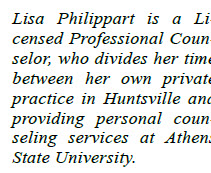 By: Lisa Philippart
By: Lisa Philippart
The pandemic has created many problems…mental, physical, spiritual, emotional, financial, relational, and marital. Most recently in my practice, I seem to be counseling couples who are struggling, either because they have spent too much time together or not enough over the past difficult year. And unfortunately, a common theme for these couples has been infidelity. (Reminder: cheating on a spouse or partner is not just physical.) So, how do you know if your partner is cheating? Usually if you are asking the question, you already suspect something, or at the very least, that something is amiss in your relationship. The signs of cheating look different in every relationship, but I believe there are some common threads that you can appear. In general, if your gut tells you that your partner is being unfaithful, there is a cause for the unease.
Here are some common warning signs that may indicate a need for concern:
 Emotional intimacy has faded. No relationship is as intense as it was in the beginning, but we do tend to bond and attach to our partner over time, learning to trust the other with our secrets and important aspects of our lives. This emotional intimacy is what keeps us bonded to our significant other, so if your partner seems less emotionally vulnerable or intimate with you expressively, that’s a strong indication that the focus has shifted to something or someone else. Your partner may show hostility toward you and your relationship. Someone who is cheating will often rationalize behavior by pushing the blame on you. They may tell themselves that you don’t look the way you did when you got married, or you don’t appreciate them, so they deserve to seek “that” elsewhere. When confronted, your partner may deflect or avoid. If your partner is cheating, the absolute last thing in the world they want to do is to talk about it with you. If you have confronted your partner, you may have been rebuffed with something like, “If you trusted me, maybe things would be better between us.” In other words, they will shift blame for what you are thinking or feeling onto you.
Emotional intimacy has faded. No relationship is as intense as it was in the beginning, but we do tend to bond and attach to our partner over time, learning to trust the other with our secrets and important aspects of our lives. This emotional intimacy is what keeps us bonded to our significant other, so if your partner seems less emotionally vulnerable or intimate with you expressively, that’s a strong indication that the focus has shifted to something or someone else. Your partner may show hostility toward you and your relationship. Someone who is cheating will often rationalize behavior by pushing the blame on you. They may tell themselves that you don’t look the way you did when you got married, or you don’t appreciate them, so they deserve to seek “that” elsewhere. When confronted, your partner may deflect or avoid. If your partner is cheating, the absolute last thing in the world they want to do is to talk about it with you. If you have confronted your partner, you may have been rebuffed with something like, “If you trusted me, maybe things would be better between us.” In other words, they will shift blame for what you are thinking or feeling onto you.
 Physical appearance has improved. If your partner suddenly starts dressing nicer or eating healthier, it could be a sign that they are trying to appear more attractive to someone (possibly you, but possibly someone else.) Is your partner being more secretive about phone or computer use? If your partner’s phone or laptop never required a password before, and now they do, that’s not a good sign. If your partner suddenly starts deleting texts and clearing browser history on a daily basis, that’s not a good sign. And if your partner never relinquishes possession of the phone, even taking it with them to the bathroom when they shower, that’s not a good sign. Additionally, there may be periods when your partner is unreachable. If your partner is cheating, they are less likely to answer calls or respond to texts. An altered schedule, when your significant other suddenly needs to work late, (and that starts to happen more frequently) it may be a signal for concern. Or if your partner has never travelled for business and suddenly finds a need to travel for work. This may also include unexplained expenses. If you see large cash withdrawals or evidence of purchases from places you never frequent, that is not good. Infidelity usually costs money: gifts, trips, dinners, and hotel rooms; the cost of cheating can add up very quickly.
Physical appearance has improved. If your partner suddenly starts dressing nicer or eating healthier, it could be a sign that they are trying to appear more attractive to someone (possibly you, but possibly someone else.) Is your partner being more secretive about phone or computer use? If your partner’s phone or laptop never required a password before, and now they do, that’s not a good sign. If your partner suddenly starts deleting texts and clearing browser history on a daily basis, that’s not a good sign. And if your partner never relinquishes possession of the phone, even taking it with them to the bathroom when they shower, that’s not a good sign. Additionally, there may be periods when your partner is unreachable. If your partner is cheating, they are less likely to answer calls or respond to texts. An altered schedule, when your significant other suddenly needs to work late, (and that starts to happen more frequently) it may be a signal for concern. Or if your partner has never travelled for business and suddenly finds a need to travel for work. This may also include unexplained expenses. If you see large cash withdrawals or evidence of purchases from places you never frequent, that is not good. Infidelity usually costs money: gifts, trips, dinners, and hotel rooms; the cost of cheating can add up very quickly.
Unfortunately, and oftentimes, with infidelity, you, the betrayed partner, are the last person to find out. The cheater’s friends often know about the infidelity from the start, and your own friends are likely to find out long before you do. This knowledge typically causes these “friends” to feel uncomfortable around you. In fact, the cheater’s friends might try to avoid you or to be overly nice to you. PLEASE NOTE: Your significant other could display all of these signs and still not be cheating. But these remain indications that something is wrong in their lives and/ or your relationship. Likewise, your partner could be exhibiting none of these indicators and still be cheating. In my next article, I will discuss healing after infidelity.
By: Lisa Philippart
Licensed Professional Counselor






